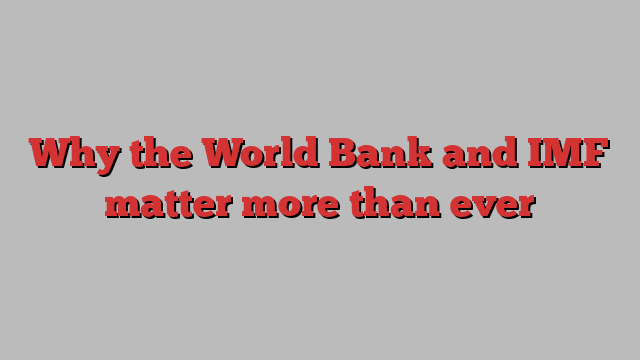
Unlock the Editor’s Digest for free
Roula Khalaf, Editor of the FT, selects her favourite stories in this weekly newsletter.
When the World Bank and IMF were conceived 80 years ago, the world was a very different place. Over half of the population lived in extreme poverty, protectionism was rife, and much of Europe had been razed to the ground. Tasked with postwar reconstruction and development, and promoting monetary co-operation, the Bretton Woods twins helped to turn things around.
Destitution has fallen sharply. Trade now accounts for over 60 per cent of global GDP, and liberal democracies have sprouted across the world. Of course, the World Bank and IMF were not solely responsible for this progress, nor were their interventions without flaws. But armed with technical expertise, significant lending capacity, and convening power, the pair did fill a void where global co-ordination was lacking.
As the twins gather next week for their annual meetings, however, they are confronting a new set of challenges which risk undoing some of what they have achieved so far.
First, their authority as a global voice has weakened. The world’s economic and demographic centre of gravity has shifted away from the US and Europe and towards China and India. But voting power in both the World Bank and IMF remains disproportionately in the west’s favour, making it harder for the pair to claim to be a truly global voice. China is already estimated to be the world’s largest creditor. Its greater role in lending to the developing world has complicated the IMF’s debt restructuring processes and undermined the institutions’ loans, which are often conditioned on reforms.
Second, the west is stepping away from many of the economic values that it backed both institutions to uphold. The US-China trade war has intensified. Tariff and non-tariff barriers are rising, as are calls for onshoring. A second “America first” agenda under Donald Trump would deepen this trend, which has seen globalisation slow and global co-operation wither.
Third, the developing world looks fragile. This week, the World Bank warned that global poverty reduction had “slowed to a near standstill” amid damaged post-pandemic economies, shocks from wars in Ukraine and the Middle East, and mounting debt payments. Structural reforms have slowed and democratisation has been uneven. Finally, the fight against global warming has raised financial pressures on the Bretton Woods pair to support the climate transition, and to build resilience across the world to extreme weather.
These are daunting pressures. But they only underscore why global co-operation is such a precious commodity. Climate change, cycles of poverty, and economic conflict between superpowers create international problems that require international solutions.
As they have done before, the World Bank and IMF must adapt. No other set of institutions can match their levels of capital, experience, and support across continents. The pair are currently consulting on how they might evolve. There are a few areas they ought to focus on. They need to better represent the world they seek to govern, and use their standing with shareholders, other lenders, and private investors to raise more finance and restructure debts faster. Their policy remedies for driving growth and reducing indebtedness also need to be more attuned to on-the-ground political realities.
The world facing the World Bank and IMF may look different today, but the spirit in which they were forged at Bretton Woods remains as important as ever. As US Treasury secretary Henry Morgenthau Jr said in his closing address at the conference in 1944: “We have come to recognise that the wisest and most effective way to protect our national interests is through international co-operation.”